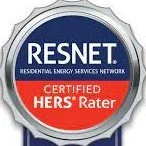-

ENERGY STAR
ENERGY STAR is a trusted program that certifies energy-efficient homes, appliances, and products, helping consumers save money while protecting the environment. ENERGY STAR-certified homes are up to 20% more efficient than standard builds, reducing utility bills and environmental impact.
-

DOE
The Department of Energy offers comprehensive resources for homeowners, including energy-saving tips, renewable energy guides, and information on home weatherization. Their tools empower consumers to reduce energy consumption and lower utility bills.
-

EPA
The Environmental Protection Agency Green Homes program provides practical advice for creating eco-friendly homes, such as improving air quality, conserving water, and reducing waste. The program supports sustainable living practices that benefit both homeowners and the environment.
-

FERC
The Federal Energy Regulatory Commission regulates and supports renewable energy initiatives, ensuring grid reliability and facilitating the integration of solar, wind, and other green energy systems into homes. It provides critical resources for homeowners adopting renewable energy solutions.
-

Smarter House
SmarterHouse offers resources to help homeowners make informed decisions about energy efficiency and sustainable living. From heating and cooling systems to lighting and appliances, it provides guidance for creating a greener, more cost-effective home.
-

USGBC
The U.S. Green Building Council promotes sustainable building practices through the LEED certification program, which recognizes energy-efficient, environmentally conscious residential and commercial properties. Homeowners can use these standards to create healthier, more sustainable living spaces.
-
HERS Index
The HERS Index is the industry standard for measuring a home’s energy efficiency, providing a score that helps homeowners and buyers understand a property’s energy performance. A lower HERS score indicates better efficiency and reduced energy costs.
-

EGLE
Environment, Great Lakes, and Energy promotes sustainability and environmental stewardship in Michigan, offering resources on energy efficiency, water conservation, and recycling. Homeowners can access local programs and incentives to make their homes more eco-friendly.
-

FDEP
The Florida Department of Environmental Protection provides resources to support sustainable living and energy efficiency in the Sunshine State. Homeowners can explore programs for renewable energy incentives, water conservation, and environmentally friendly landscaping practices tailored to Florida’s unique climate.

